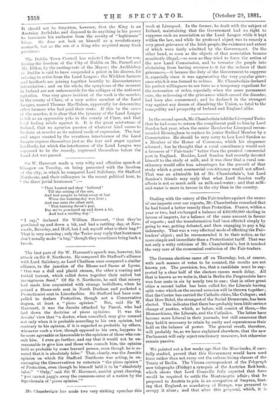The German elections came off on Thursday, but, of course,.
with such masses of votes to be counted, the results are not known yet. The provision, too, that a candidate must be sup- ported by a clear half of the electors causes much delay. All that is known as we write is, that in Berlin the Progressists have won four seats in six by nearly two to one; that in other great cities a second ballot has been called for, the Liberals having split votes which on the second occasion will be thrown together ; that the Centre has carried the Catholic cities, like Cologne; and that Herr Bebel, the strongest of the Social Democrats, has been elected. This indicates that there has probably been little mime change of parties, which, as before, will consist of three,—the Bismarckiaus, the Liberals, and the Catholics. The latter have become more Liberal in their journals, but still announce that they hold it necessary to retain by amity and separateness their hold on the balance of power. The general result, therefore, will probably be, as we have explained elsewhere, that the new Parliament will only reject reactionary measures, but otherwise remain passive.


































 Previous page
Previous page